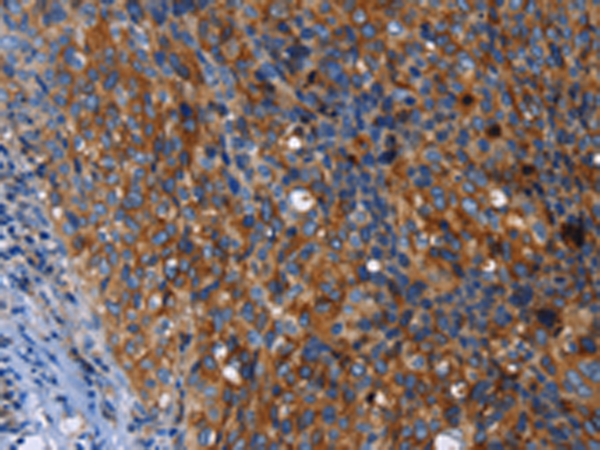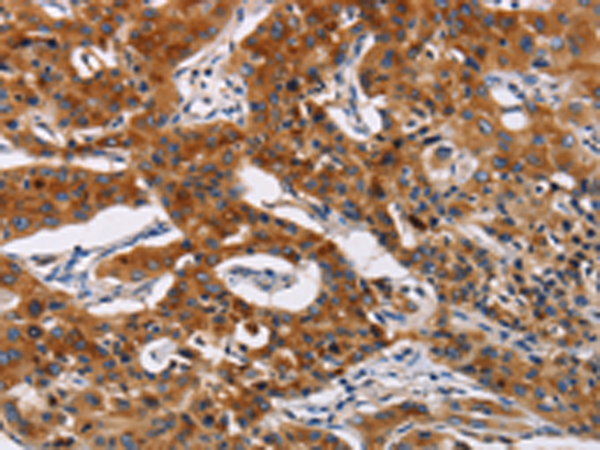

| WB | 咨询技术 | Human,Mouse,Rat |
| IF | 咨询技术 | Human,Mouse,Rat |
| IHC | 1/50-1/200 | Human,Mouse,Rat |
| ICC | 技术咨询 | Human,Mouse,Rat |
| FCM | 咨询技术 | Human,Mouse,Rat |
| Elisa | 1/1000-1/5000 | Human,Mouse,Rat |
| Aliases | MPF; SMRP |
| Host/Isotype | Rabbit IgG |
| Antibody Type | Primary antibody |
| Storage | Store at 4°C short term. Aliquot and store at -20°C long term. Avoid freeze/thaw cycles. |
| Species Reactivity | Human |
| Immunogen | Fusion protein of human MSLN |
| Formulation | Purified antibody in PBS with 0.05% sodium azide and 50% glycerol. |
+ +
以下是3-4篇关于MSLN抗体的代表性文献,简要概括如下:
---
1. **文献名称**:*"Mesothelin-targeted CAR T-cell therapy for solid tumors"*
**作者**:Beatty, G.L. 等(2014)
**摘要**:研究报道了一种靶向MSLN的CAR-T细胞疗法在胰腺癌模型中的效果,通过基因工程改造T细胞使其表达抗MSLN抗体结构域,显著抑制肿瘤生长并延长生存期,验证了MSLN作为实体瘤免疫治疗靶点的潜力。
---
2. **文献名称**:*"Phase I study of SS1P, a recombinant anti-mesothelin immunotoxin in advanced solid tumors"*
**作者**:Hassan, R. 等(2014)
**摘要**:首次在晚期实体瘤患者中评估抗MSLN免疫毒素SS1P(抗体与细菌毒素偶联物)的I期临床试验,结果显示部分患者肿瘤缩小,证实了MSLN抗体的治疗安全性和初步疗效。
---
3. **文献名称**:*"Mesothelin as a biomarker for targeted therapy"*
**作者**:Thay, D.S. 等(2019)
**摘要**:综述了MSLN在多种癌症(如间皮瘤、卵巢癌)中的高表达特性,并探讨其作为治疗性抗体(如ADC和双抗)及诊断标志物的应用潜力,强调其在精准医学中的价值。
---
4. **文献名称**:*"Antibody-drug conjugate targeting mesothelin demonstrates efficacy in preclinical models"*
**作者**:Zhou, Z. 等(2020)
**摘要**:开发了一种新型抗MSLN抗体药物偶联物(ADC),通过体外和动物实验证明其可特异性结合MSLN阳性肿瘤细胞,释放化疗药物并诱导凋亡,为临床转化提供了依据。
---
以上文献覆盖了MSLN抗体在CAR-T、免疫毒素、ADC及诊断领域的应用,均为该领域的标志性研究。如需具体文献链接或补充细节,可进一步提供方向。
**Background of MSLN Antibodies**
Mesothelin (MSLN) is a cell-surface glycoprotein encoded by the *MSLN* gene, initially identified as a tumor-associated antigen. It is expressed at low levels in normal mesothelial cells lining pleura, peritoneum, and pericardium but is overexpressed in several malignancies, including mesothelioma, pancreatic, ovarian, and lung cancers. This restricted normal tissue expression and tumor-specific upregulation make MSLN an attractive therapeutic target.
MSLN plays roles in cell adhesion, proliferation, and signaling, primarily through interaction with CA125 (MUC16), promoting metastasis and tumor progression. Antibodies targeting MSLN have been developed to exploit its cancer-specific expression. These include naked monoclonal antibodies (e.g., amatuximab), antibody-drug conjugates (ADCs), and chimeric antigen receptor (CAR) T-cell therapies. ADCs like anetumab ravtansine deliver cytotoxic agents directly to MSLN-positive cells, while CAR-T therapies aim to redirect immune cells against tumors.
Challenges include managing on-target, off-tumor toxicity due to low-level MSLN expression in normal tissues and addressing heterogeneous MSLN expression across tumors. Despite this, clinical trials show promise, particularly in mesothelioma and ovarian cancer. Biomarker-driven patient selection is critical to enhance efficacy. Overall, MSLN antibodies represent a growing frontier in precision oncology, with ongoing research focused on optimizing delivery, combination regimens, and novel engineering strategies to improve therapeutic outcomes.
×